学科教学语文研究生必读书目
学科教学(语文)推荐书目
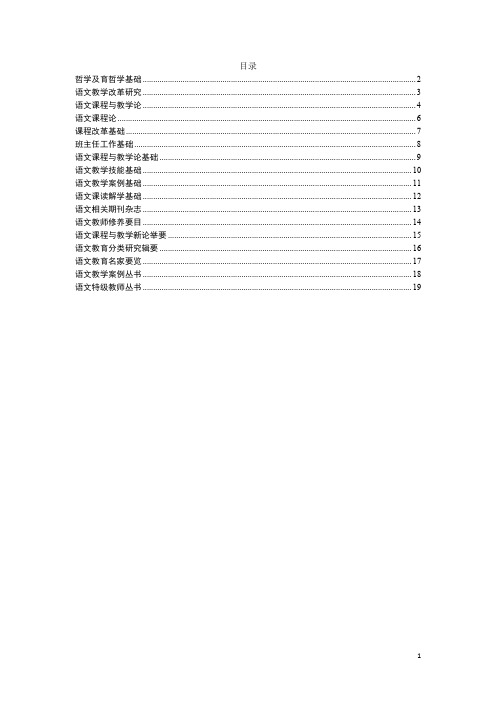
目录哲学及育哲学基础 (2)语文教学改革研究 (3)语文课程与教学论 (4)语文课程论 (6)课程改革基础 (7)班主任工作基础 (8)语文课程与教学论基础 (9)语文教学技能基础 (10)语文教学案例基础 (11)语文课读解学基础 (12)语文相关期刊杂志 (13)语文教师修养要目 (14)语文课程与教学新论举要 (15)语文教育分类研究辑要 (16)语文教育名家要览 (17)语文教学案例丛书 (18)语文特级教师丛书 (19)哲学及育哲学基础01.《哲学解释学》,伽达默尔著,上海译文出版社1985年版。
02.《人论》,卡西尔著,上海译文出版社1985年版。
03.《什么是教育》(邹进译),雅斯贝尔斯著,三联书店1991年版。
04 《课程与教学哲学》,张楚廷,人民教育出版社,2003年版语文教学改革研究09.《叶圣陶语文教育论集》,叶圣陶著,教育科学出版社1980年版。
10.《吕叔湘语文教育论集》,吕叔湘著,人民教育出版社1984年版。
11.《张志公语文教育论集》,张志公著,人民教育出版社1994年版。
12.《实与活――刘国正语文教育论文选》,刘国正著,人民教育出版社1998年版。
13.《语文教育论稿》,顾黄初著,人民教育出版社1995年版。
14.《中国语文教育忧思录》,王丽,教育科学出版社1998年版.15.《审视中学语文教育》,孔庆东、摩罗、余杰,汕头大学出版社1999年版。
16.《问题与对策:中小学语文教育改革》,钟晓雨主编,人民教育出版社2000年版。
17.《直谏中学语文教学》,孙绍振,南方日报出版社2003年版。
18.《语文教育门外谈》,钱理群著,广西师大出版社2003年版。
19.《对话语文》,钱理群、孙绍振著,福建人民出版2005年版。
语文课程与教学论1叶澜《中国基础教育的文化使命》,教育科学出版社2001年版2郝德永《课程与文化》,教育科学出版社2002年版3小威廉姆·E·多尔《后现代课程观》(王红宇译),教育科学出版社2002年版4石中英《知识转型与教育改革》,教育科学出版社2001年版5史密斯《全球化与后现代教育学》,教育科学出版社2000年版6徐继存《课程论问题研究》,甘肃教育出版社2001年版7钟启泉《学科教学论基础》,华东师范大学出版社2001年版8滕守尧《审美心理描述》,中国社会科学出版社1985年版9钱理群《语文教学门外谈》,广西师范大学出版社2003年版10曹明海《语文教育文化学》,山东教育出版社2005年版11卡西尔《人论》(甘阳译),上海文艺出版社1985年版12申小龙《语言与文化的现代思考》,河南人民出版社2002年版13雅斯贝尔斯《什么是教育》(邹进译),三联书店1991年版14王岳川《现象学与解释学文论》,山东教育出版社1999年版15伽达默尔《哲学解释学》,上海译文出版社1999年版16伽达默尔《真理与方法》,上海译文出版社1999年版17曹明海《当代语文教育与课程改革理论前沿丛书》,山东人民出版社2007年版18威廉·F·派纳《理解课程》,教育科学出版社2003年版19姚斯《审美经验与文学解释学》,上海译文出版社1997年版20海德格尔《存在与时间》,三联书店1999年版21申小龙《语言的文化阐释》,知识出版社1992年版22陆有铨《现代西方教育哲学》,河南教育出版社2000年版23钟启泉《世界课程与教学新理论文库》,教育科学出版社2002年版24王炳照等《中国教育思想通史》,湖南教育出版社1994年版25罗斯特《西方教育的历史和哲学基础》,华夏出版社1987年版26伊塞尔《阅读活动:审美反应理论》,中国社会科学出版社1991年版27曹明海《语文教育文化过程研究》,山东教育出版社2005年版28潘庆玉《语文教育发展论》,青岛海洋大学出版社2001年版29联合国科教文组织《教育:财富蕴藏其中》,教育科学出版社1993年版30金生鈜《理解与教育》,教育科学出版社1997年版20.《课程与教学论》,张华,上海教育出版社2000年版。
学科教学语文研究生必读书目

学科教学语文研究生必读书目第一篇:学科教学语文研究生必读书目学科教学语文研究生必读书目一、著作类(50种)[1]小威廉姆·E·多尔:后现代课程观(王红宇译)[M].北京:教育科学出版社2002年版.[2]大卫·杰弗里·史密斯:全球化与后现代教育学[M].北京:教育科学出版社,2001年版.[3张华:课程与教学论[M].上海:上海教育出版社,2000年版.[4]雅斯贝尔斯:什么是教育(邹进译)[M].北京:三联书店,1991年版.[5]Bruce Joyce等著,荆建华等译:教学模式[M].北京:中国轻工业出版社,2009年版.[6]古德、布罗菲著,陶志琼译:透视课堂[M].北京:中国轻工业出版社,2002年版.[7]佐藤学著,钟启泉译:静悄悄的革命——创造活动的、合作的、反思的综合性学习[M].长春:长春出版社,2003年版.[8]加里•D.鲍里奇著,易东平译:有效教学方法[M].南京:江苏教育出版社,2002年版.[9]马克斯•范梅南著,李树英译:教学机智——教学智慧的意蕴[M].北京:人教育科学出版社,2001年版.[10] 钟启泉、崔允郭主编:新课程的理念与创新(师范生读本)[M].北京:高等教育出版社,2003年版.[11]靳健:后现代文化视界的语文课程与教学论[M].兰州:甘肃教育出版社,2006年版.[12]倪文锦、欧阳汝颖:语文教育展望[M].上海:华东师大出版社,2002年版.[13]王荣生:语文科课程论基础[M].上海:上海教育出版社,2006年版.[14]倪文锦、谢锡金:新编语文课程与教学论[M].上海:华东师范大学出版社,2006年版.[15]林存华:听课的变革[M].教育科学出版社,2007.[16]郑金洲:说课的变革[M].教育科学出版社,2007.[17]沈毅等:课堂观察——走向专业的听评课[M].华东师范大学出版社,2009.[18]欧培民:语文课堂教学行为研究及案例[M].江西教育出版社,2009.[19]王尚文:语文教学对话论[M].浙江教育出版社,2004.[20]姚素珍:香港中学文学教学研究[M].广东教育出版社,2006.[21]张永德:香港小学文学教学研究[M].广东教育出版社,2006.[22]蔡美惠:台湾中学国文教学研究[M].广东教育出版社,2006.[23]方智范:初中语文新课程案例分析[M].高等教育出版社,2008.[24]李山林:语文课程与教学论案例教程[M].湖南师范大学出版社,2006年版.[25]王荣生:走进课堂——高中语文必修课例分析[M].高等教育出版社,2006年版.[26]李镇西:听李镇西老师讲课[M].华东师范大学出版社,2005年版.[27]袁卫星:听袁卫星老师讲课[M].华东师范大学出版社,2005年版.[28]窦桂梅:听窦桂梅老师讲课[M].华东师范大学出版社,2005年版.[29]韩军:听韩军老师讲课[M].华东师范大学出版社,2006年版.[30]余映潮:听余映潮老师讲课[M].华东师范大学出版社,2006年版.[31]郭初阳:言说抵抗沉默——郭初阳课堂实录[M].华东师范大学出版社,2006年版.[32]郑桂华:听郑桂华老师讲课[M].华东师范大学出版社,2007年版.[33]王荣生:听王荣生教授评课[M].华东师范大学出版社,2007年版.[34]雷玲:好课是这样炼成的——品读名师经典课堂(语文卷)[M].华东师大出版社,2007.年版.[35]雷玲:名师教学机智例谈(语文卷)[M].华东师范大学出版社,2007年版.[36]王爱娣:美国语文教育[M].广西师范大学出版社,2007年版.[37]钱理群:语文教学门外谈[M].桂林:广西师范大学出版社,2003年版.[38]钱理群:名作重读[M].上海:上海教育出版社,2006版.[39] 洪宗礼等:母语教材研究(全十卷)[M].南京:江苏教育出版社,2008版.[40] 王荣生、郑桂华:1978-2005语文教育研究大系:中学卷[M].上海:上海教育出版社,2007版.[41] 王富仁、郑国民:语文教学与文学/文艺学与中小学语文教学研究丛书[M].广州:广东教育出版社,2006版.[42] 孙绍振:名作细读[M].上海:上海教育出版社,2006版.[43] 王荣生:新课标与“语文教学内容”[M].南宁:广西教育出版社,2004版.[44] 张隆华,曾仲珊:中国古代语文教育[M].成都:四川教育出版社,2000年版.[45] 李杏保,顾黄初:中国现代语文教育史[M].成都:四川教育出版社,2000年版.[46] 王荣生主编:走进课堂——高中语文必修课例分析[M].北京:高等教育出版社,2006年版.[47] 张田若、陈良璜、李卫民:中国当代汉字认读与书写[M].成都:四川教育出版社,2000.[48] 韩雪屏:中国当代阅读理论与阅读教学[M].成都:四川教育出版社,2000年版.[49] 张鸿苓:中国当代听说理论与听说教学[M].成都:四川教育出版社,2000年版.[50] 章熊:中国当代写作与阅读测试[M].成都:四川教育出版社,2000年版.二、期刊类1.《人大复印资料·中学语文教与学》,中国人民大学报刊复印资料中心主办2.《课程·教材·教法》,人民教育出版社课程教材研究所主办3.《中学语文教学》,首都师范大学主办4.《语文学习》,上海教育出版社主办5.《语文教学通讯》,山西师范大学主办6.《语文建设》,国家语委语言文字报刊社主办7.《语文教学与研究》,华中师范大学8.《中学语文教学参考》,陕西师范大学教育出版集团·杂志社主办 9.《教育研究》,中央教育科学研究所主办 10.《新华文摘》,人民出版社主办第二篇:学科教学语文必读书目七、必读书目1.叶圣陶.叶圣陶语文教育论集[M].教育科学出版社,1984.2.张隆华.中国语文教育史纲[M].湖南师范大学出版社,1991.3.张隆华、曾仲珊.中国古代语文教育史[M].四川教育出版社,1994.4.顾黄初、李杏保.中国现代语文教育史[M].四川教育出版社,1995.5.王松泉、张良田.中国语文教育史简编[M].社会科学文献出版社,2001.6.周庆元.语文教育研究概论[M].湖南人民出版社,2005.7.周庆元.语文教育哲学研究[M].湖南师范大学出版社,2009.8.周庆元.语文教学设计论[M].广西教育出版社,1997.9.程大琥.语文学科论[M].湖南出版社,1998.10.程大琥.教学目的论[M].湖南教育出版社,2000. 10.程大琥.语文名师研究[M].湖南教育出版社,2004.11.张良田.语篇交际原理与语文教学[M].湖南师范大学出版社,2003.12.张良田.初中语文教学策略[M].北京师范大学出版社,2010.13.张良田.教学手段论[M].湖南教育出版社,1999.14.阳利平.传承与嬗变:语文教师专业素质研究[M].浙江大学出版社,2010.15.李维鼎.语文课程初论[M].浙江教育出版社,2004.16.李维鼎.语文教材别论[M].浙江教育出版社,2004.17.曾祥芹.文章学与语文教育[M].上海教育出版社,1995.18.倪宝元.语言学与语文教育[M].上海教育出版社,1994. 19.王松泉.阅读教育学[M].辽宁大学出版社,1995. 20.王松泉.阅读教材论[M].辽宁大学出版社,1995.21.李海林.言语教学论[M].上海教育出版社,2000.22.刘国正.我和语文教学[M].人民教育出版社,1984.23.朱绍禹.美日苏语文教学[M].吉林文史出版社,1993. 24.倪文锦、洪宗礼、柳士镇.母语教材研究[M].2007第三篇:学科语文必读书目(范文模版)1.《语文教师教学知识发展研究》朱晓民著教育科学出版社2.《追求卓越——教师专业发展案例研究》徐碧美著人民教育出版社3.《中学语文名篇多元解读》王丽主编广东教育出版社4、《语文教学与文学》王富仁郑国民主编广东教育出版社5、《教学名家谈语文》裴跃进编著北京师范大学出版社6、《美国语文教育》王爱娣著广西师范大学出版社7.《“非指示性”语文教学设计研究》郑逸农著浙江大学出版社8.《语文教学设计技法80讲》余映潮著 9.《听王荣生教授评课》王荣生著10、《翻转课堂的可汗学院:互联时代的教育革命》萨尔曼·可汗(Salman Khan)(著), 刘婧(译)11、学习性评价丛书(中学版)伊恩—斯密斯(著)12.名作细读——微观分析个案研究作者孙绍振著上海教育出版社.13、《文学欣赏与文本解读》魏天无华中师范大学出版社14、《语文课堂“学情视角”重构》陈隆升著上海教育出版社15、《学生为中心的课堂讨论》编辑(美)黒尔,(美)斯蒂著,刘雅译16、《教师专业发展的多元途径》, 徐斌艳著,上海教育出版社2008年出版17、《有效教学的基本策略》余文森,刘冬岩编18《让学生的思维活起来名师最能激发潜能的课堂提问艺术》严永金主编西南师范大学出版社19、《有效教学十讲》余文森著华东师范大学出版社20、《名师备课与课堂有效性》徐世贵著,重庆大学出版社21、《教师教学写作360°》周一贯著宁波出版社第四篇:研究生必读书目1汉语言文学专业必读书目一、作品1、鲁迅《鲁迅自选集》;2、郁达夫《沉沦》;3、老舍《四世同堂》;4、钱钟书《围城》;5、茅盾《子夜》;6、沈从文《边城》;7、穆旦《穆旦诗文集》;8、巴金《家》;9、曹禺《雷雨》;10、张爱玲《倾城之恋》;11、林海音《城南旧事》;12、白先勇《台北人》;13、聂华苓《桑青与桃红》;14、柳青《创业史》;15、路遥《平凡的世界》;16、高行健《车站》;17、张承志《金牧场》;18、莫言《红高粱家族》;19、王小波《黄金时代》;20、苏童《妻妾成群》;21、余华《许三观卖血记》;22、王安忆《长恨歌》。
语文教育专业必读书目
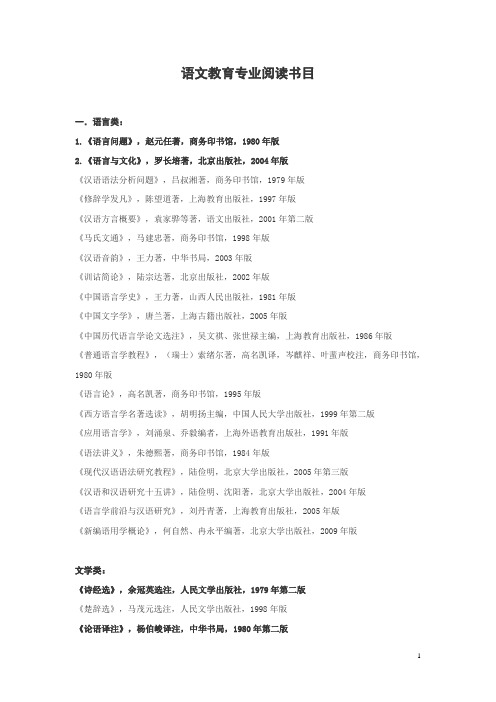
语文教育专业阅读书目一.语言类:1.《语言问题》,赵元任著,商务印书馆,1980年版2.《语言与文化》,罗长培著,北京出版社,2004年版《汉语语法分析问题》,吕叔湘著,商务印书馆,1979年版《修辞学发凡》,陈望道著,上海教育出版社,1997年版《汉语方言概要》,袁家骅等著,语文出版社,2001年第二版《马氏文通》,马建忠著,商务印书馆,1998年版《汉语音韵》,王力著,中华书局,2003年版《训诂简论》,陆宗达著,北京出版社,2002年版《中国语言学史》,王力著,山西人民出版社,1981年版《中国文字学》,唐兰著,上海古籍出版社,2005年版《中国历代语言学论文选注》,吴文祺、张世禄主编,上海教育出版社,1986年版《普通语言学教程》,(瑞士)索绪尔著,高名凯译,岑麒祥、叶蜚声校注,商务印书馆,1980年版《语言论》,高名凯著,商务印书馆,1995年版《西方语言学名著选读》,胡明扬主编,中国人民大学出版社,1999年第二版《应用语言学》,刘涌泉、乔毅编者,上海外语教育出版社,1991年版《语法讲义》,朱德熙著,商务印书馆,1984年版《现代汉语语法研究教程》,陆俭明,北京大学出版社,2005年第三版《汉语和汉语研究十五讲》,陆俭明、沈阳著,北京大学出版社,2004年版《语言学前沿与汉语研究》,刘丹青著,上海教育出版社,2005年版《新编语用学概论》,何自然、冉永平编著,北京大学出版社,2009年版文学类:《诗经选》,余冠英选注,人民文学出版社,1979年第二版《楚辞选》,马茂元选注,人民文学出版社,1998年版《论语译注》,杨伯峻译注,中华书局,1980年第二版《孟子译注》,杨伯峻译注,中华书局,1960年版《庄子今注今译》,陈鼓应译注,中华书局,1983年版《乐府诗选》,余冠英选,人民文学出版社,1954年第二版《史记选》,王伯祥选,人民文学出版社,1982年第二版《陶渊明集》,逯钦立校注,中华书局,1979年版《李白诗选》,复旦大学中文系古典文学教研组选注,人民文学出版社,1977年第二版《杜甫诗选》,萧涤非选注,人民文学出版社,1979年版《李商隐选集》,周振甫选注,江苏教育出版社,2006年版《唐宋八家文选》,牛宝彤选,甘肃人民出版社,1984年版《唐人小说》,汪辟疆校录,上海古籍出版社,1978年版《唐诗选》,中国社会科学院文学所编,人民文学出版社,2003年版《唐宋词选》,中国社科院文学所编,人民文学出版社,1981年版《宋诗选注》,钱钟书选注,三联书店,2002年版《苏轼选集》,王水照选注,上海古籍出版社,1984年版《元人杂剧选》顾学颉,人民文学出版社, 1998年版第1版《辛弃疾词选》,朱德才选注,人民文学出版社,1988年版《西厢记》,王实甫著,王季思校注,上海古籍出版社,1978年版;1995版《三国演义》,罗贯中著,人民文学出版社,1973年第三版《水浒传》,施耐庵著,人民文学出版社,1997年第二版《西游记》,吴承恩著,人民文学出版社,1980年第二版《今古奇观》,抱瓮老人辑,人民文学出版社,1957年版《牡丹亭》,汤显祖著,人民文学出版社,1963年版《聊斋志异选》,张友鹤选注,人民文学出版社,1978年第二版《儒林外史》,吴敬梓著,人民文学出版社,1958年版《红楼梦》,曹雪芹著,俞平伯校,启功注,人民文学出版社,2000年版《长生殿》,洪升著,人民文学出版社,1983年第二版《桃花扇》,孔尚任著,人民文学出版社,1958年版《老残游记》,刘鹗著,人民文学出版社,1957年版《呐喊》,鲁迅著,人民文学出版社,2003年版《〈女神〉及轶诗》,郭沫若著,人民文学出版社,2008年版《郁达夫全集》,郁达夫著,浙江大学出版社,2007年版《新月诗选》(修订版),蓝棣之编选,人民文学出版社,1989年版《子夜》,茅盾著,人民文学出版社,2004年版《家》,巴金著,人民文学出版社,2002年版《沈从文小说名篇》,沈从文著,时代文艺出版社,2010年版《骆驼祥子》,老舍著,人民文学出版社,2008年版《曹禺选集》,曹禺著,人民文学出版社,2004年版《艾青诗全编》,艾青著,人民文学出版社,2003年版《围城》,钱钟书著,人民文学出版社,2003年版《传奇》,张爱玲著,北京十月文艺出版社,2006年版《赵树理选集》,人民文学出版社,2004年版《现代诗名著名篇解读》,蓝棣之著,人民文学出版社,2007年版《创业史》,柳青著,人民文学出版社,2005年版《茶馆》,老舍著,人民文学出版社,2003年版《王蒙作品精编》,王蒙著,漓江出版社,2007年版《余光中作品精选》,余光中著,长江文艺出版社,2009年版《朦胧诗选》,杨克、陈亮编选,中国青年出版社2009年版《中国当代文学作品选》,洪子诚主编,北京大学出版社,2008年版《白鹿原》,陈忠实著,作家出版社, 2009年版《海子诗全集》,海子著、西川编,作家出版社,2009年版《红高粱》,莫言著,中国青年出版社,2008年版《穆斯林的葬礼》,霍达著,人民文学出版社,2005年版《平凡的世界》,路遥著,北京十月文艺出版社,2010年版《张承志作品精选》,张承志著,长江文艺出版社,2006年版《尘埃落定》,阿来著,作家出版社,2009年版《活着》,余华著,作家出版社2008年版《第一次亲密接触》,蔡智恒著,万卷出版公司,2008年版《长恨歌》,王安忆著,人民文学出版社,2004年版《雍正皇帝》,二月河著,长江文艺出版社,2009年版《秦腔》,贾平凹著,作家出版社,2008年版《烦恼人生》,池莉著,长江文艺出版社,2000年版《一个人的战争》,林白著,作家出版社,2009年版《藏獒》,杨志军著,人民文学出版社,2005年版《石榴树上结樱桃》,李洱著,北京十月文艺出版社,2008年版《希腊的神话和传说》,(德)斯威布著,楚图南译,人民文学出版社,1959年版《俄狄浦斯王》(《索福克勒斯悲剧二种》)罗念生译,人民文学出版社,1961版《神曲》,(意)但丁著,王维克译,人民文学出版社,1997年版《哈姆莱特》(《莎士比亚悲剧四》),卞之琳译,人民文学出版社,1988年版《伪君子》,(法)莫里哀著,赵少侯译,人民文学出版社,1955年版《浮士德》,(德)歌德著,董问樵译,复旦大学出版社,2001年第二版《悲惨世界》,(法)雨果著,李丹、方于译,人民文学出版社,1992年版《红与黑》,(法)司汤达著,郝运译,上海译文出版社,1989年版《高老头》,(法)巴尔扎克著,傅雷译,人民文学出版社,1963年版《包法利夫人》,福楼拜著,李健吾译,人民文学出版社2003年版《双城记》,(英)狄更斯著,石永礼、赵文娟译,人民文学出版社,1993年版《德伯家的苔丝》,(英)哈代著,张谷若译,人民文学出版社,1957年版《安娜·卡列尼娜》(俄)托尔斯泰著,周扬、谢索台译,人民文学出版社,1956年版《卡拉马佐夫兄弟》,(俄)陀思妥耶夫斯基著,耿济之译,人民文学出版社,1981年版《母亲》,(俄)高尔基著,夏衍译,人民文学出版社,1973年第二版《百年孤独》,(哥伦比亚)加西亚·马尔克斯著,黄锦炎等译,上海译文出版社,1984年版《喧哗与骚动》,(美)福克纳著,李文俊译,上海译文出版社,2004年版《等待戈多》,(法)萨缪埃尔·贝克特著,收在《荒诞派戏剧选》,外国文学出版社,1983年版《沙恭达罗》,(印)迦梨陀娑著,季羡林译,人民文学出版社,1980年第二版《泰戈尔诗选》,(印)泰戈尔著,冰心等译,人民文学出版社,1994年第二版《雪国》,(日)川端康成著,高慧勤译,漓江出版社,1985初版《一千零一夜》,(阿拉伯)纳训译,人民文学出版社,1957年版《外国文学作品选》(两卷本),郑克鲁编,高等教育出版社,2005年版《追忆似水年华》,(法)普鲁斯特著,李恒基、徐继曾等译,译林出版社,2001年版。
语文教学与研究参考书目

参考书目1.朱慕菊,走进新课程——与课程实施者对话,北京师范大学出版社。
2002。
2.钟启泉,新课程的理念与创新——师范生读本,高等教育出版社,2003。
3.陆志平,语文课程新探——新课程理念与语文课程改革,东北师范大学出版社,2002。
4.曹明海,语文教育思想论,青岛海洋大学出版社,2002。
5.武玉鹏,名师研究——中学著名特级教师的教学实践和思想,中国文联出版社,2001。
6.于漪语文教育论集,人民教育出版社,1996。
7.钱梦龙,导读的艺术,人民教育出版社,1995。
8.魏书生文选,漓江出版社,1995。
9.教育改革家——魏书生,北京教育出版社,1991。
10.李镇西,从批判走向建设——语文教育手记,四川少年儿童出版社,1999。
11.全日制义务教育语文课程标准,北京师范大学出版社,2001。
12.普通高中语文课程标准,人民教育出版社,2003。
13.倪文锦主编,初中语文新课程教学法;小学语文新课程教学法;高中语文新课程教学法,“基础教育新课程教师教育系列教材”,高等教育出版社2003年5月、2003年7月、2004年。
14.王尚文主编,中学语文教学研究,高等教育出版社2002年7月出版。
15.郑国民著,新世纪语文课程改革研究,北京师范大学出版社2003年3月出版。
16. 倪文锦、欧阳汝颖主编,语文课程展望,华东师范大学出版社2002年2月出版。
17. 顾黄初、顾振彪著,语文课程与语文教材,社会科学文献出版社2001年9月出版。
18.施良方,课程理论——课程的基础、原理与问题,教育科学出版社1996年。
19.叶谰,课程改革与课程评价,教育科学出版社2001。
20.新课程培训问题研究课题组,新课程与教师角色转变,教育科学出版社,2001。
21.黄光硕,语文教材论,人民教育出版社,1996。
22.顾黄初、顾振彪,语文课程与语文教材,社会科学文献出版社,2001。
23.王荣生,语文科课程论基础,上海教育出版社,2003。
语文学科教学的方向必读书目

语文学科教学方向必读书目历史学科教学方向必读书目英语学科教学方向物理学科教学方向化学学科教学方向教育管理数学学科教学方向(英文版)Two regulations promulgated for implementation is in the party in power for a long time and the rule of law conditions, the implementation of comprehensive strictly strategic plan, implementation in accordance with the rules and discipline to manage the party, strengthen inner-party supervision of major initiatives. The two regulations supporting each other, the < code > adhere to a positive advocate, focusing on morality is of Party members and Party leading cadres can see, enough to get a high standard; < rule > around the party discipline, disciplinary ruler requirements, listed as "negative list, focusing on vertical gauge, draw the party organizations and Party members do not touch the" bottom line ". Here, the main from four square face two party rules of interpretation: the first part introduces two party Revised regulations the necessity and the revision process; the second part is the interpretation of the two fundamental principles of the revision of laws and regulations in the party; the third part introduces two party regulations modified the main changes and needs to grasp several key problems; the fourth part on how to grasp the implementation of the two regulations of the party. < code > and < Regulations > revised the necessity and revisedhistory of the CPC Central Committee the amendment to the Chinese Communist Party members and leading cadres honest politics several guidelines > and < Chinese Communist Party discipline and Punishment Regulations > column 1 by 2015 to strengthen party laws and regulations focus. Two party regulations revision work lasted a Years, pooling the wisdom of the whole party, ideological consensus, draw historical experience, respect for the wisdom of our predecessors, which reflects the unity of inheritance and innovation; follow the correct direction, grasp the limited goals, adhere to the party's leadership, to solve the masses of the people reflect a focus on the problem. The new revision of the < code > and < rule >, reflects the party's 18 and the eighth session of the third, the spirit of the fourth plenary session, reflecting the experience of studying and implementing the General Secretary Xi Jinping series of important speech, reflects the party's eighteen years comprehensive strictly practice. (a) revised two regulations of the party need of < the ICAC guidelines > in < in 1997 Leaders as members of the Communist Party of China clean politics certain criteria (Trial) > based on revised, the promulgation and implementation of January 2010, to strengthen the construction of the contingent of leading cadres play animportant role. But with the party to manage the party strictly administering the deepening, has not been able to fully meet the actual needs. Content is too complicated, "eight prohibition, 52 are not allowed to" hard to remember, and also difficult to put into practice; the second is concisely positive advocated by the lack of prohibited provisions excessive, no autonomy requirements; the third is banned terms and discipline law, both with the party discipline, disciplinary regulations repeat and Criminal law and other laws and regulations repeat; the fourth is to "clean" the theme is not prominent, not for the existing problems, and is narrow, only needle of county-level leading cadres above. < rule > is in 1997 < Chinese Communist Party disciplinary cases (Trial) > based on revision, in December 2003 the promulgation and implementation, to strengthen the construction of the party play very important role. Along with the development of the situation, which many provisions have been unable to fully meet the comprehensive strictly administering the practice needs. One is Ji law, more than half of the provisions and criminal law and other countries laws and regulations Repetition; two is the political discipline regulations is not prominent, not specific, for violation of the party constitution, damage theauthority of Party Constitution of misconduct lack necessary and serious responsibility to pursue; third is the main discipline for the leading cadres, does not cover all Party members. Based on the above situation, need to < the criterion of a clean and honest administration > and < rule > the two is likely to be more relevant regulations first amendment. By revising, really put the authority of Party discipline, the seriousness in the party tree and call up the majority of Party members and cadres of the party constitution of party compasses party consciousness. (II) two party regulations revision process the Central Committee of the Communist Party of China attaches great importance to two regulations revision . Xi Jinping, general books recorded in the Fifth Plenary Session of the eighth session of the Central Commission for Discipline Inspection, on the revised regulations < > made clear instructions. According to the central deployment, the Central Commission for Discipline Inspection from 2014 under six months begin study two regulations revision. The Standing Committee of the Central Commission for Discipline Inspection 4 review revised. Comrade Wang Qishan 14 times held a special meeting to study two regulations revision, amendment clarifies the direction, major issues of principle, path and target,respectively held a forum will listen to part of the province (area) secretary of the Party committee, Secretary of the Discipline Inspection Commission, part of the central ministries and state organs DepartmentThe first party committee is mainly responsible for people, views of experts and scholars and grassroots party organizations and Party members. Approved by the Central Committee of the Communist Party of China, on 7 September 2015, the general office of the Central Committee of the Party issued a notice to solicit the provinces (autonomous regions, municipalities) Party, the central ministries and commissions, state ministries and commissions of the Party (party), the General Political Department of the military, every 3 people organization of Party of two regulations revision opinion. Central Commission for Discipline Inspection of extensive solicitation of opinions, careful study, attracting, formed a revised sent reviewers. In October 8 and October 12, Central Committee Political Bureau Standing Committee and the Political Bureau of the Central Committee After consideration of the two regulations revised draft. On October 18, the Central Committee of the Communist Party of China formally issued two regulations. Can say, two laws amendment concentrated thewisdom of the whole party, embodies the party. Second, < code > and < Regulations > revision of the basic principles of two party regulations revision work and implement the party's eighteen, ten eight plenary, the spirit of the Fourth Plenary Session of the Eleventh Central Committee and General Secretary Xi Jinping important instructions on the revised < low political criterion > and < Regulations >, highlighting the ruling party characteristics, serious discipline, the discipline quite in front of the law, based on the current, a long-term, advance as a whole, with Bu Xiuding independent < rule > and < rule >. Main principle is: first, adhere to the party constitution to follow. The constitution about discipline and self-discipline required specific, awaken the party constitution of party compasses party consciousness, maintaining the authority of the constitution. General Secretary Xi Jinping pointed out that "no rules, no side round. Party constitution is the fundamental law, the party must follow the general rules. In early 2015 held the eighth session of the Central Commission for Discipline Inspection Fifth Plenary Session of the 16th Central Committee, Xi Jinping again pointed out that constitution is the party must follow the general rules, but also the general rules." the revision of the< code > and < rule > is Method in adhere to the regulations established for the purpose of combining rule of virtue is to adhere to the party constitution as a fundamental to follow, the constitution authority set up, wake up the party constitution and party rules the sense of discipline, the party constitution about discipline and self-discipline specific requirements. 4 second is to adhere to in accordance with the regulations governing the party and the party. The Party of rule of virtue "de", mainly refers to the party's ideals and beliefs, excellent traditional style. The revised the < code > closely linked to the "self-discipline", insisting on the positive initiative, for all members, highlight the "vital few", emphasized self-discipline, focusing on the morality, and the majority of Party members and the ideological and moral standards. The revised < > Ji method separately, Ji, Ji Yan to Method, as a "negative list", emphasizing the heteronomy, focusing on vertical gauge. Is this one high and one low, a positive reaction, the strict party discipline and practice results transformation for the integration of the whole party to observe moral and discipline requirements, for the majority of Party members and cadres provides benchmarking and ruler. Third, insist on to. In view of the problems existing in theparty at the present stage, the main problems of Party members and cadres in the aspect of self-discipline and abide by the discipline to make clearly defined, especially the party's eighteen years strict political discipline and political rules, organization and discipline and to implement the central eight provisions of the spirit against the four winds and other requirements into Disciplinary provisions. Not one pace reachs the designated position, focusing on in line with reality, pragmatic and effective. After the revision of major changes, major changes in the < code > and < rule > modified and needs to grasp several key problems (a) < code > < code > adhere to according to regulations governing the party and party with morals in combination, for at the present stage, the leadership of the party members and cadres and Party members in existing main problems of self-discipline, put forward principles, requirements and specifications, showing Communists noble moral pursuit, reflected at all times and in all over the world ethics from high from low 5 common requirements. One is closely linked to the "self-discipline", removal and no direct relation to the provisions of . the second is adhere to a positive advocate, "eight prohibition" 52 are not allowed to "about the content of the" negative list moved into synchronizationamendment < cases >. Three is for all the party members, will apply object from the leadership of the party members and cadres to expand to all Party members, fully embodies the comprehensive strictly required. The fourth is prominent key minority, seize the leadership of the party members and cadres is the key, and put forward higher requirements than the ordinary Party members. Five is to simplify, and strive to achieve concise, easy to understand, easy to remember. The revised < code > is the ruling Party since the first insists on a positive advocate forAll Party members and the self-discipline norms, moral declaration issued to all members of the party and the National People's solemn commitment. > < criterion of a clean and honest administration consists of 4 parts, 18, more than 3600 words. After the revision of the < code >, a total of eight, 281 words, including lead, specification and Party member cadre clean fingered self-discipline norms, etc. Part 3 members low-cost clean and self-discipline, the main contents can be summarized as "four must" "eight code". Lead part, reiterated on ideal and faith, fundamental purpose, the fine traditions and work style, noble sentiments, such as "four must" the principle of requirements, strong tone of self-discipline, The higher request for 6 andsupervised tenet, the foothold in permanent Bao the party's advanced nature and purity, to reflect the revised standards requirements. Members of self-discipline norms around the party members how to correctly treat and deal with the "public and private", "cheap and rot" thrifty and extravagance "bitter music", put forward the "four norms". Party leader cadre clean fingered self-discipline norms for the leadership of the party members and cadres of the "vital few", around the "clean politics", from civil servant of the color, the exercise of power, moral integrity, a good family tradition and other aspects of the leadership of the party members and cadres of the "four norms" < > < norm norm. "The Party member's self-discipline norms" and "party members and leading cadre clean fingered self-discipline norms," a total of eight, collectively referred to as the "eight". "Four must" and "eight" of the content from the party constitution and Party's several generation of leaders, especially Xi Jinping, general secretary of the important discussion, refer to the "three discipline and eight points for attention" statements, and reference some embody the Chinese nation excellent traditional culture essence of epigrams. (2) the revised regulations, the main changes in the revised Regulations > to fully adapt to thestrictly requirements, reflects the according to the regulations governing the law of recognition of deepening, the realization of the discipline construction and Jin Ju. < rule > is party a ruler, members of the basic line and follow. And the majority of Party members and cadres of Party organizations at all levels should adhere to the bottom line of thinking, fear discipline, hold the bottom line, as a preventive measure, to keep the party's advanced nature and purity. 1, respect for the constitution, refinement and discipline. Revised < rule > from comprehensive comb physical constitution began, the party constitution and other regulations of the Party of Party organizations and Party discipline requirements refinement, clearly defined in violation of the party constitution will be in accordance with regulations to give the corresponding disciplinary action. The original 10 categories of misconduct, integration specification for political discipline, discipline, honesty and discipline masses Ji Law and discipline and discipline and other six categories, the content of < rule > real return to Party discipline, for the majority of Party members and listed a "negative list. 7 2, highlighting the political discipline and political rules. > < Regulations according to the stage of the discipline of outstandingperformance, emphasizing political discipline and political rules, organization and discipline, in opposition to the party's leadership and the party's basic theory, basic line, basic program and basic experience, the basic requirement of behavior made prescribed punishment, increase the cliques, against the organization such as violation of the provisions, to ensure that the central government decrees and the Party of centralized and unified. 3, adhere to strict discipline in the law and discipline In front, Ji separated. Revised < Regulations > adhere to the problem oriented, do Ji separated. Any national law existing content, will not repeat the provisions, the total removal of 79 and criminal law, repeat the content of the public security management punishment law, and other laws and regulations. In the general reiterated that party organizations and Party members must conscientiously accept the party's discipline, die van comply with national laws and regulations; at the same time, to investigate violations of Party members and even criminal behavior of Party discipline and responsibility, > < Regulations distinguish five different conditions, with special provisions were made provisions, so as to realize the connection of Party discipline and state law. 4, reflect Wind building and anti-corruptionstruggle of the latest achievements. < rule > the party's eighteen years implement the spirit of the central provisions of the eight, against the requirements of the "four winds" and transformation for disciplinary provisions, reflecting the style construction is always on the road, not a gust of wind. In the fight against corruption out of new problems, increase the trading rights, the use of authority relatives profit and other disciplinary terms. Prominent discipline of the masses, the new against the interests of the masses and ignore the demands of the masses and other disciplinary terms and make provisions of the disposition and the destruction of the party's close ties with the masses.Discipline to protect the party's purpose. 8 of these regulations, a total of three series, Chapter 15, 178, more than 24000 words, after the revision of the regulations a total of 3 series, Chapter 11, 133, 17000 words, divided into "general" and "special provisions" and "Supplementary Provisions" Part 3. Among them, add, delete, modify the provisions of the proportion of up to nearly 90%. 1, the general general is divided into five chapters. The first chapter to the regulations of the guiding ideology, principles and scope of application of the provisions, highlight the strengthening ofthe party constitution consciousness, maintenance the authority of Party Constitution, increase the party organizations and Party members must abide by the party constitution, Yan Centralized centralized, would examine at all levels of the amended provisions implementing and maintaining Party discipline, and consciously accept the party discipline, exemplary compliance with national laws and regulations. The second chapter of discipline concept, disciplinary action types and effects of the regulations, will be a serious warning from the original a year for a year and a half; increase the Party Congress representative, by leaving the party above (including leave probation) punishment, the party organization should be terminated its representative qualification provisions. The third chapter of the disciplinary rules of use prescribed in the discipline rectifying process, non convergence, not close hand classified as severely or heavier punishment. "Discipline straighten "At least eighteen years of five years, these five years is to pay close attention to the provisions of the central eight implementation and anti -" four winds ". The fourth chapter on suspicion of illegal party disciplinary distinguish five different conditions, with special provisions were madeprovisions, to achieve effective convergence of Party and country 9 method. < rule > the provisions of Article 27, Party organizations in the disciplinary review found that party members have committed embezzlement, bribery, dereliction of duty dereliction of duty and other criminal law act is suspected of committing a crime shall give cancel party posts, probation or expelled from the party. The second is < Regulations > Article 28 the provisions of Party organizations in the disciplinary review But found that party members are stipulated in the criminal law, although not involved in a crime shall be investigated for Party discipline and responsibility should be depending on the specific circumstances shall be given a warning until expelled punishment. This situation and a difference is that the former regulation behavior has been suspected of a crime, the feeling is quite strict, and the latter for the behavior not involving crime, only the objective performance of the provisions of the criminal code of behavior, but the plot is a crime to slightly. < Regulations > the 29 provisions, Party organizations in the discipline review found that party members and other illegal behavior, affect the party's image, the damage to the party, the state and the people's interests, we should depend on the situationSeriousness given disciplinary action. The loss of Party members, seriously damaging the party's image of behavior, should be given expelled from the party. At this article is party member is in violation of the criminal law outside the other illegal acts, such as violates the public security administration punishment law, customs law, financial laws and regulations behavior. The fourth is < cases > Article 32 stipulates, minor party members and the circumstances of the crime, the people's Procuratorate shall make a decision not to initiate a prosecution, or the people's court shall make a conviction and exempted from criminal punishment shall be given within the party is removed from his post, probation or expelled from the party. Party members and crime, sheets were fined in accordance with For acts; the principal Ordinance amended the provisions of the preceding paragraph. This is the new content, in order to achieve Ji method effective convergence. Five is < > the thirty third article 10 of the provisions, the Party member due to an intentional crime is sentenced to criminal law (including probation) sheets or additional deprivation of political rights; due to negligence crime and was sentenced to three years or more (excluding three years) a penalty, shall give expelled punishment. Due to negligence crime is convictedand sentenced to three years (including three years) in prison or be sentenced to public surveillance, detention, shall in general be expelled from the party. For the individual may not be expelled from the party, should control Approval. This is followed and retained the original > < Regulations the provisions of punishment party authorization rules and report to a level party organizations. For is "party members with criminal acts, and by the criminal punishment, generally should be expelled from the party". The fifth chapter of probationary Party member of the discipline and discipline after missing members of the treatment and punishment decisions, such as the implementation of the provisions, clear the related party discipline and punishment decision made after, for duties, wages and other relevant alteration formalities for the longest time. 2, sub sub section will the original regulations of10 categories of acts of violation of discipline integration revised into 6 categories, respectively, in violation of the punishments for acts of political discipline "in violation of discipline behavior of punishment" in violation of integrity of disciplinary action points "of violation punishments for acts of mass discipline" "the violation of work discipline, punishment" in violation of discipline of life behaviorpunishment "6 chapters. 3, annex" Supplementary Provisions "clear authority making supplementary provisions of, cases of interpretative organ, as well as regulations implementation time and retroactivity etc.. 11 (3) learning understanding > < regulations needs to grasp several key problems The first problem -- about the violation of political discipline behavior > < new ordinance chapter 6 the political discipline column for the six disciplines, that is the main opposition to Party leadership and the opposition of the basic theory, basic line, basic program and basic experience, basic requirements of misconduct made provisions of the disposition, especially the eighteen since the CPC Central Committee put forward the Yan Mingzheng treatment of discipline and political rules requirements and practical achievements transformation for Discipline article, increase the false debate central policies, cliques, against the organization review, make no discipline of the principle of harmony terms. These are the party's eighteen years in comprehensive strictly Process combined with the practice of rich content. (1) false debate the central policies and undermine the Party of centralized and unified the problem is made in accordance with the provisions of the party constitution. Constitution in general programme requirementsadhere to democratic centralism is one of the requirements of the construction of the party must adhere to the four cardinal. Application of this principle is not only the party the basic organization principle and is also the mass line in party life, it requires that we must fully develop inner-party democracy, respect for the dominant position of Party members, safeguarding the Party member democratic rights, give full play to the enthusiasm and creativity of the party organizations at all levels and Party members, at the same time, also must implement the right concentration, ensure the party's mission < the chaos in unity and concerted action to ensure that the party's decision to get quickly and effectively implementing. The Party Central Committee formulated the major principles and policies, through different channels and ways, fully listen to the party organizations and Party members of the opinions and suggestions, but 12 is some people face to face not to say back blather "" will not say, after the meeting said, "" Taiwan does not say, and nonsense ", in fact, not only disrupt the people thought, some causing serious consequences, the damage to the Party of the centralized and unified, hinder the central policy implementation, but also a serious violation of the democratic system of principles. There is no doubt that shall, inaccordance with the Regulations > 4 Specified in Article 6 to give the appropriate punishment. For did not cause serious consequences, to give criticism and education or the corresponding tissue processing. (2) about the destruction of the party's unity < New Regulations > the forty eighth to fifty second article, to damage Party's unity unified and violation of political discipline, punishment situation made explicit provisions. Article 52 of the new "in the party get round group, gangs seek private gain, cliques, cultivate private forces or through the exchange of interests, for their own to create momentum and other activities to gain political capital, given a serious warning or withdraw from their party posts disposition; if the circumstances are serious, to give Leave a party to observation or expelled from the party. (3) on against the organization review of the provisions of the constitution, party loyalty honesty is party members must comply with the obligations. Members must obey the organization decision, shall not violate the organization decided encounters by asking questions to find organization, rely on the organization, shall not deceive the organization, against the organization. For example, after the investigation does not take the initiative to explain the situation, but to engage inoffensive and defensive alliance, hiding the stolen money is against survey organization, is a violation of the behavior of political discipline. Article 24 of the original > < Regulations, although the provisions of the interference, hinder group review the behavior of the fabric can be severely or 13 Aggravated punishment, but did not put this kind of behavior alone as a discipline for qualitative amount of discipline. > < new regulations increase the Article 57, "anti organization review, one of the following acts, given a warning or serious warning; if the circumstances are relatively serious, giving removed from or placed on probation within the party post; if the circumstances are serious, give expelled from the party: (a) on supply or forged, destroyed, transfer, conceal evidence; (II) to prevent others expose, providing evidence Material; (III) harboring co personnel; (4) to the organization to provide false information, to hide the fact;(5) the him against the acts of the organization review. "< rule > add this clause to the Constitution requires more specific, the previous no punishment in accordance with the definite list and put forward clear punishment in accordance with. (4) about organizing or participating in superstitious activities as < Regulations > about engage in activities of。
语文教育硕士必读书
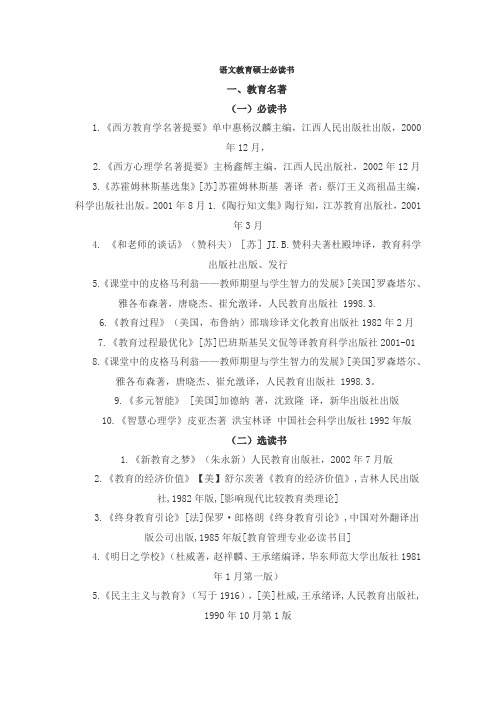
语文教育硕士必读书一、教育名著(一)必读书1.《西方教育学名著提要》单中惠杨汉麟主编,江西人民出版社出版,2000年12月,2.《西方心理学名著提要》主杨鑫辉主编,江西人民出版社,2002年12月3.《苏霍姆林斯基选集》[苏]苏霍姆林斯基著译者:蔡汀王义高祖晶主编,科学出版社出版。
2001年8月1.《陶行知文集》陶行知,江苏教育出版社,2001年3月4. 《和老师的谈话》(赞科夫)[苏]JI.B.赞科夫著杜殿坤译,教育科学出版社出版、发行5.《课堂中的皮格马利翁——教师期望与学生智力的发展》[美国]罗森塔尔、雅各布森著,唐晓杰、崔允潡译,人民教育出版社 1998.3.6.《教育过程》(美国,布鲁纳)邵瑞珍译文化教育出版社1982年2月7.《教育过程最优化》[苏]巴班斯基吴文侃等译教育科学出版社2001-018.《课堂中的皮格马利翁——教师期望与学生智力的发展》[美国]罗森塔尔、雅各布森著,唐晓杰、崔允潡译,人民教育出版社 1998.3。
9.《多元智能》 [美国]加德纳著,沈致隆译,新华出版社出版10.《智慧心理学》皮亚杰著洪宝林译中国社会科学出版社1992年版(二)选读书1.《新教育之梦》(朱永新)人民教育出版社,2002年7月版2.《教育的经济价值》【美】舒尔茨著《教育的经济价值》,吉林人民出版社,1982年版,[影响现代比较教育类理论]3.《终身教育引论》[法]保罗·郎格朗《终身教育引论》,中国对外翻译出版公司出版,1985年版[教育管理专业必读书目]4.《明日之学校》(杜威著,赵祥麟、王承绪编译,华东师范大学出版社1981年1月第一版)5.《民主主义与教育》(写于1916),[美]杜威,王承绪译,人民教育出版社,1990年10月第1版6.《教育和美好的生活》杨汉麟译,作者:(英)伯特兰·罗素出版社:河北人民出版社,出版日期: 2001年6月7.《爱弥尔》[法]卢梭,李平沤译,商务印书馆, 1978年版8.《孩子们!你好!》苏联,阿莫纳什维利著,朱佩荣先生翻译,教育科学出版社出版,2002年2月,(《孩子们,你们好!》、《孩子们,你们生活得怎样?》、《孩子们,祝你们一路平安!》学校无分数教育三部曲)9.《学习,别听学校的》(德国,菲拉·费·毕尔肯比尔著,江苏人民出版社,2000年9月注:此书为德国中小学教师必读书)10.《教育诗》[苏]柯著磊然译人民文学出版社1957年版。
语文教育专业阅读书目
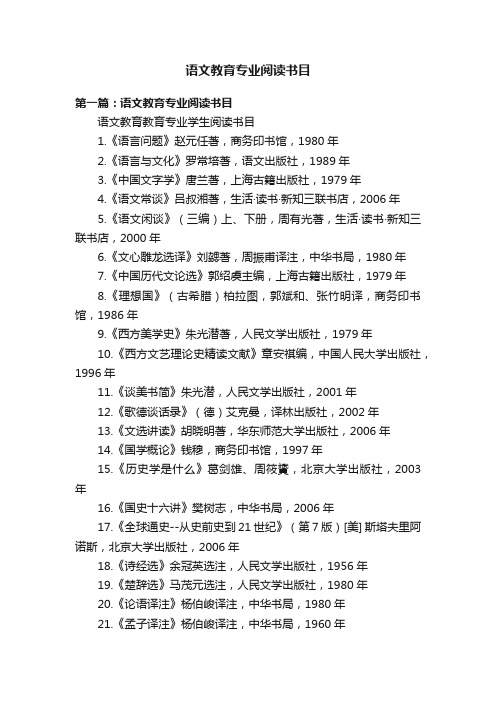
语文教育专业阅读书目第一篇:语文教育专业阅读书目语文教育教育专业学生阅读书目1.《语言问题》赵元任著,商务印书馆,1980年2.《语言与文化》罗常培著,语文出版社,1989年3.《中国文字学》唐兰著,上海古籍出版社,1979年4.《语文常谈》吕叔湘著,生活·读书·新知三联书店,2006年5.《语文闲谈》(三编)上、下册,周有光著,生活·读书·新知三联书店,2000年6.《文心雕龙选译》刘勰著,周振甫译注,中华书局,1980年7.《中国历代文论选》郭绍虞主编,上海古籍出版社,1979年8.《理想国》(古希腊)柏拉图,郭斌和、张竹明译,商务印书馆,1986年9.《西方美学史》朱光潜著,人民文学出版社,1979年10.《西方文艺理论史精读文献》章安祺编,中国人民大学出版社,1996年11.《谈美书简》朱光潜,人民文学出版社,2001年12.《歌德谈话录》(德)艾克曼,译林出版社,2002年13.《文选讲读》胡晓明著,华东师范大学出版社,2006年14.《国学概论》钱穆,商务印书馆,1997年15.《历史学是什么》葛剑雄、周筱贇,北京大学出版社,2003年16.《国史十六讲》樊树志,中华书局,2006年17.《全球通史--从史前史到21世纪》(第7版)[美] 斯塔夫里阿诺斯,北京大学出版社,2006年18.《诗经选》余冠英选注,人民文学出版社,1956年19.《楚辞选》马茂元选注,人民文学出版社,1980年20.《论语译注》杨伯峻译注,中华书局,1980年21.《孟子译注》杨伯峻译注,中华书局,1960年22.《庄子今注今译》陈鼓应译注,中华书局,1983年23.《乐府诗选》余冠英选,人民文学出版社,1959年24.《史记选》王伯祥选,人民文学出版社,1957年25.《唐诗选》中国社会科学院文学所编,人民文学出版社,1978年26.《唐宋词选》中国社科院文学所编,人民文学出版社,1982年27.《唐宋八家文选》牛宝彤选,甘肃人民出版社,1986年28.《元人杂剧选》顾肇仓选注,人民文学出版社,1962年29.《西厢记》王实甫著,王季思校注,人民文学出版社,1978年30.《三国演义》罗贯中著,人民文学出版社,1957年31.《水浒传》施耐庵著,人民文学出版社,1975年32.《西游记》吴承恩著,人民文学出版社,1955年33.《聊斋志异选》张友鹤选注,人民文学出版社,1978年34.《儒林外史》吴敬梓著,人民文学出版社,1977年35.《红楼梦》曹雪芹著,人民文学出版社,1982年36.《鲁迅小说集》人民文学出版社,1990年37.《新月诗选》陈梦家编,上海书店复印,1985年38.《子夜》茅盾著,人民文学出版社,1994年39.《家》巴金著,人民文学出版社,1979年40.《郁达夫小说集》,浙江人民出版社,1982年41.《沈从文小说选集》,人民文学出版社,1982年42.《骆驼祥子》老舍著,人民文学出版社,1999年43.《曹禺选集》曹禺著,人民文学出版社,1978年44.《艾青诗选》艾青著,人民文学出版社,1988年45.《围城》钱钟书著,人民文学出版社,1980年46.《唐吉诃德》(西)塞万提斯著,杨绛译,人民文学出版社,年47.《哈姆莱特》(《莎士比亚悲剧四种》)卞之琳译,人民出版社,1988年48.《悲惨世界》(法)雨果著,李丹、方于译,人民文学出版社,1983年49.《红与黑》(法)司汤达著,郝运译,上海译文出版社,1986年50.《高老头》(法)巴尔扎克著,傅雷译,人民文学出版社,1954年51.《大卫·科波菲尔》(英)狄更斯著,石永礼译,人民文学出版社,1993年52.《德伯家的苔丝》(英)哈代著,张谷若泽,人民文学出版社,1957年53.《罪与罚》(俄)陀思妥耶夫斯基著,岳麟、荣如德译,上海译文出版社,2004年54.《安娜·卡列尼娜》(俄)托尔斯泰著,周扬、谢索台译,人民文学出版社,1978年55.《母亲》(俄)高尔基著,瞿秋白等泽,人民文学出版社,1980年56.《爱弥儿》(法)卢梭著,李平沤译,商务印书馆,2006年57.《学记评注》高时良编撰,人民教育出版社,1983年58.《大教学论》(捷克)夸美纽斯著,傅任敢译,人民教育出版社,1999年59.《民主主义与教育》(美)杜威著,王承绪译,人民教育出版社,2001年60.《给教师的建议》(苏)瓦•阿•苏霍姆林斯基著,杜殿坤译,教育科学出版社,1999年61.《中国教育家评传》(精选本)沈灌群、毛礼锐主编,上海教育出版社,2000年62.《外国教育家评传》(精选本)赵祥麟主编,上海教育出版社,2000年63.《西方古代教育论著选》华东师大、浙江大学教育系主编,人民教育出版社,2001年64.《西方近代教育论著选》任仲印主编,人民教育出版社,2001年65.《西方现代教育论著选》王承绪、赵祥麟编译,人民教育出版社,2001年66.※《形而上学》(古希腊)亚里士多德,吴寿彭译,商务印书馆,1981年67.※《应用语言学》刘涌泉、乔毅编著,上海外语教育出版社,1991年68.※《社会语言学》陈原编,商务印书馆,2000年69.※《汉语语法分析问题》吕叔湘著,商务印书馆,1979年70.※《训诂简论》陆宗达著,北京出版社,1980年71.※《中国历代语言学论文选注》吴文棋、张世禄主编,上海教育出版社,1986年72.※《西方语言学名著选读》胡明扬主编,中国人民大学出版社,1988年73.※《语言学概论》(重排版)高名凯石安石主编,中华书局,1987年74.※《20世纪西方美学名著选》蒋孔阳主编,复旦大学出版社,1987年75.※《诗学》亚里斯多德著,罗念生译,人民文学出版社,1982年76.※《文学理论》(美)韦勒克·沃伦著,刘象愚等译,三联书店,1984年77.※《比较文学与文学理论》(美)韦斯坦因著,刘象愚译,辽宁人民出版社,1987年78.※《资治通鉴选》王仲荦等编注,中华书局,1965年79.※《中国历代政治得失》钱穆,生活·读书·新知三联书店,2005年80.※《世界近代史》刘宗绪,北京师范大学出版社,2004年81.※《国史概要》(第三版)樊树志,复旦大学出版社,2004年82.※《近代中国社会的新陈代谢》陈旭麓,上海社会科学出版社,2006年83.※《双城记》(英)狄更斯著,石永礼译,人民文学出版社,1993年84.※《卡拉马佐夫兄弟》(俄)陀思妥耶夫斯基著,岳麟、荣如德译,上海译文出版社,2004年85.※《城堡》(奥)卡夫卡著,李文俊、汤永宽译,河北教育出版社,年86.※《拉封丹寓言诗》(法)拉封丹,译林出版社,年87.※《格列佛游记》(英)斯威夫特,上海译文出版社,2006年88.※《爱丽丝漫游奇境记》(英)刘易斯·卡洛尔,上海译文出版社,2006年89.※《汤姆·索亚历险记》(美)马克·吐温,出版社,年90.※《海底两万里》(法)凡尔纳,译林出版社,2003年91.※《夏洛的网》E.B.怀特,上海译文出版社,2004年92.※《尼尔斯骑鹅旅行记》(瑞)拉格洛夫,上海译文出版社,2007年93.※《金银岛》斯蒂文森,上海译文出版社,2006年94.※《木偶奇遇记》科洛迪,人民文学出版社,1985年95.※《星球大战》威尔斯博纳特,新蕾出版社,1985年96.※ 《洋葱头历险记》罗大里,上海译文出版社,年97.※《小王子》圣埃克絮佩里,上海译文出版社年98.※《哈里·波特》J.K.罗林,人民文学出版社,2003年99.※《淘气包马小跳》杨红樱,接力出版社,2004年100.※《陈伯吹童话》陈伯吹,湖南少年儿童出版社,1985年101.※《叶君健童话故事集》叶君健,明天出版社,1985年102.※《皮皮鲁历险记》郑渊洁,学苑出版社,2005年103.※《中国古代寓言选》人民文学出版社,1981年104.※《科学的历程》吴国盛著,北京大学出版社,2002年105.※《寂静的春天》(美)蕾切尔·卡逊(Rachel Carson)著,吉林人民出版社,1997年106.※《昆虫记》(法)法布尔著,国际文化出版公司,2005年107.※《关于托勒密和哥白尼两大世界体系的对话》,(意)伽利略著,北京大学出版社,2006年108.※《狭义与广义相对论浅说》(美)爱因斯坦著,北京大学出版社,2006年109.※《物种起源》(英)达尔文(C.Darwin)著,商务印书馆,1981年110.※《时间简史》(普及版)史蒂芬·霍金,列纳德·蒙洛迪诺著,湖南科学技术出版社,2006年111.※《海陆的起源》(德)魏格纳著,北京大学出版社,2006年112.※《化学哲学新体系》(英)道尔顿著,北京大学出版社,2006年113.※《自然哲学之数学原理》(英)牛顿著,北京大学出版社,2006年114.※《天体运行论》(波)哥白尼著,北京大学出版社,2006年115.※《中国古代科学思想史》(英)李约瑟著,江西人民出版社,2006年116.※《颜氏家训译注》庄辉明,章义和,上海古籍出版社,1999年117.※《和教师的谈话》(苏)B.赞科夫著,杜殿坤译,教育科学出版社,1999年118.※《儿童发展》(美)劳拉·E·贝克著,吴颖等译,江苏教育出版社,2002年119.※《终身教育引论》(法)保尔·朗格朗著,周南照、陈树清译,中国对外翻译出版社,1985年 120.※《人的教育》(德)福禄倍尔著,孙祖复译,人民教育出版社,2001年121.※《学校无分数三部曲》(苏)阿莫纳什维利著,朱佩荣译,教育科学出版社,2001年122.※《教育漫话》(英)约翰·洛克著,徐诚、杨汉麟译,河北人民出版社,1998 年123.※《学会关心——教育的另一种模式》(美)内尔·诺丁斯著于天龙译,教育科学出版社,2003年124.※《自我实现的人》(美)马斯洛著,徐金声等译,三联书店,1986年125.※《窗边的小豆豆》(日)黑柳彻子著,南海出版公司,2003年126.※《教育科学与儿童心理学》皮亚杰著,傅统先译,文化教育出版社,1981年127.※《裴斯泰洛齐教育论著选》(瑞士)裴斯泰洛齐著,夏之莲等译,人民教育出版社,2001年128.※《学习理论:教育的视角》(美)戴尔·H·申克著,韦小满等译,江苏教育出版社,2003年129.※《中国神话传说》袁珂,中国民间文艺出版社,1984年130.※《唐人小说》汪辟疆校录,上海古籍出版社,1978年131.※《汉魏六朝诗选》余冠英选注,人民文学出版社,1959年132.※《宋诗选注》钱钟书选注,人民文学出版社,1989年133.※《今古奇观》抱瓮老人辑,人民文学出版社,1979年134.※《牡丹亭》汤显祖著,人民文学出版社,1982年135.※《长生殿》洪昇著,人民文学出版什,1983年136.※《桃花扇》孔尚任著,人民文学出版社,1958年137.※《老残游记》刘鹗著,人民文学出版社,1959年138.※《野草》鲁迅著,人民文学出版社,1979年139.※《女神》郭沫若著,人民文学出版社,1978年140.※《传奇》张爱玲,上海书店影印本,1985年141.※《林语堂文选》,中国广播电视出版社,1990年142.※《周作人自选精品集》,河北人民出版社,1994年143.※《丰子恺文选》,浙江文艺,1992年144.※《赵树理选集》人民文学出版社,1958年145.※《现代派诗选》蓝棣之编选,人民文学出版社,1986年146.※《创业史》(第一部)柳青著,中国青年出版社,1960年147.※《茶馆》(收《茶馆》《龙须沟》)老舍著,人民文学出版社,1994年148.※《王蒙代表作》张学正编,黄河文艺出版社,1990年149.※《白鹿原》陈忠实著,人民文学出版社,1993年150.※《余光中精品文集》安徽人民出版社,1999年151.※《台湾小说选》《台湾小说选》编辑委员会选编,人民文学出版社,1983年152.※《中国当代文学作品选》王庆生主编,华中师范大学出版社,1997年153.※《希腊的神话和传说》(德)斯威布著,楚图南译,人民文学出版社,1977年154.※《俄狄浦斯王》(《索福克勒斯悲剧二种》)罗念生译,人民文学出版社,1961年155.※《神曲》(意)但丁著,王维克译,人民文学出版社,1980年156.※《伪君子》(法)莫里哀著,李健吾译,上海译文出版社,1980年157.※《浮士德》(德)歌德著,董问樵译,复旦大学出版社,1982年158.※《变形记》(奥)卡夫卡著,李文俊、汤永宽译,河北教育出版社,年159.※《百年孤独》(哥伦比亚)加西亚·马尔克斯著,黄锦炎等译.上海译文出版社,1984年160.※《喧哗与骚动》(美)福克纳著,李文俊译,上海译文出版社,1984年161.※《第二十二条军规》(美)约瑟夫·海勒著,杨恝、程爱民等译,译林出版社,1998年162.※《等待戈多》(法)萨缪埃尔·贝克特著,见《荒诞派戏剧选》外国文学出版社,1998年163.※《沙恭达罗》(印)迦梨陀娑著,季羡林译,人民文学出版社,1984年164.※《新月集》泰戈尔,人民文学出版社,2006年165.※《源氏物语》紫式部著,丰子恺译,人民文学出版社,1980年166.※《雪国》(日)川端康成著,高慧勤译,漓江出版社,1985年167.※《一千零一夜》(阿)纳训译,人民文学出版社,1957版168.※《外国文学作品选》(两卷本)郑克鲁编,复旦大学出版社,1999年169.※《伊索寓言》古希腊伊索,北京燕山出版社,年170.※《格林童话》(德)格林,上海译文出版社,年171.※《安徒生童话》(丹麦)安徒生,上海译文出版社,年172.※《鲁宾逊漂流记》(英)狄福,上海译文出版社,2006年173.※《爱的教育》(意)亚米契斯,人民文学出版社,1998年174.※《三寄小读者》冰心,少年儿童出版社,1981年175.※《男生贾里》秦文君,少年儿童出版社,1994年第二篇:小学语文教育书目小学语文教育书目小学语文教学622003 年第3期总247 期东方套餐39.00新标准及基础教育课程改革系列新课程优秀教学设计与案例: 小学语言卷22.20 新课程优秀教学设计与案例: 小学综合卷22.80 语文新程标准3.00 语文课标解读16.50 数学课程标准8.70 数学课标解读23.50新课程理念下的创新教学设计: 小学语文9.80 新课程理念与语文课程改革8.50新课程理念与小学数学课程改革9.00 新课程教学设计: 一年级语文9.80新课程教学案例荟萃: 一年级语文9.80 教师教学究竟靠什么12.00 新教材将会给教师带来些什么10.80 谁来决定我们学校的课程10.80课程的反思与重建10.80新课程师资培训精要16.00走向发展性课程评价10.80新课程中教师行为的变化19.80新课程中课堂行为的变化26.00综合实践活动设计与实施22.00教会学生思维26.00 师生沟通艺术18.20 教育新理念20.00 研究性学习概论18.00 信息技术与课程整合10.80世纪, 谁来教综合课程10.80基础教育课程与教学研究18.00信息技术教育与学科课程整合21.60 探究教学的学习与辅导13.60 校本课程与课程资源开发12.50信息技术与教学创新20.00合作学习的理念与实施25.00走进新课程: 与课程实施者的对话18.00 教学的革命: 创新教育课程设计21.80 教学名家及教学技能系列实用小学语文教学90法15.50名师教案: 小学语文15.00名师授课录: 小学语文25.80李吉林情境教学的理论与实践15.50 丁有宽读写结合教学教例经验15.50 于永正语文教学教例与作文实践15.00 顾家漳语文教学教例与经验16.10张平南阅读教学教例与作文实践14.00顾汝佐课堂教学设计指引和评介(小数)17.90 叶季明数学教学的理论与实践(小数)16.80 张天孝数学教学教例与教法(小数)17.50 公民的诞生(苏霍姆林斯基)20.00给教师的建议(苏霍姆林斯基)31.00和教师的谈话(赞科夫)17.00怎样培养真正的人(苏霍姆林斯基)19.00 魏书生教育教学艺术(五册)50.00怎样听课评课17.80 评课艺术12.00学法指导艺术12.00 自主课堂10.00自我调节学习12.00 思维教学12.00开发学习潜力18.00 透视课堂36.00成功教学的策略有效的教学实习指南20.00 学习障碍的消除策略12.00非常教师优质教学精髓16.00学习动机的激发与策略12.00教师成功秘笈创新教育八法20.80 课堂教学技能训练指导24.00 小学语文课堂教学技能训练11.00小学语文说课百例16.00小学语文说课的理论与实践16.80课堂教学艺术精品集(3卷)63.40作文技巧100 例19.00新编小学作文教与学12.50小学作文训练艺术16.00小学作文教学设计13.00小学作文教案全集14.00小学生发展性阅读教育研究14.00小学语文阅读教学设计24.00小学教育论文撰写与例举11.00特级教师教学论文荟萃26.00小学教师科研论文导写18.00特级教师教学案例集录(中小学)17.00 小学生主题班队会活动的组织与指导18.00 21 世纪中小学主题班会实例集锦15.00 班级常规管理与教育14.00班主任工作艺术15.00转化后进生的理论与方法10.00创造性地建设班集体14.00世纪班主任工作案例12.00中小学计算机辅助教学课件制作实用教程28.00 活动课及辅导系列小学综合实践活动9.80综合实践活动指南活动方案21.00 综合实践活动指南活动支持(一)综合实践活动指南活动支持(二)综合实践活动指南活动手册(一)综合实践活动指南活动手册(二)中小学教育科研指导丛书校本研究指导15.00 实验研究指导14.00 质的研究指导18.00 课堂观察指导13.00 研究性学习系列丛书研究性学习: 研究性学习指导14.00研究性学习百法: 研究性学习的组织与管理15.00 研究性学习百论: 研究性学习与创新教育15.80 研究性学习百例: 数学7.80研究中学习(上下)19.00研究性学习百例: 文科综合14.80研究性学习百例: 理科综合12.80德育、班主任与家教小学班主任12.00 班主任工作漫谈16.00 个别心理辅导15.30 人格心理辅导18.00 生理心理辅导14.60 学习心理辅导16.00 班级心理辅导15.20 班主任新思维26.00 小学班主任工作艺术10.00 班主任工作技能训练指导22.00全国模范班主任教育思想和管理艺术(小学)12.50 小学生心理素质训练20.50青少年心理卫生与心理咨询14.00教师心理调适与训练10.00学校心理咨询优秀案例集15.00新课标课程改革课例精选小语VCD识字课40.00 小狗待售40.00詹天佑40.00 花儿学校40.00作文指导40.00新课标课程改革课例精选小数VCD转转盘40.00 了解学校40.00桌子有多长40.00 认识更大的数40.00 长正方体表面积40.00全国特级教师创新教学设计系列小学语文创新教学设计(含CD-ROM)低年级26.80 中年级26.80 高年级26.80 新课程优秀教师课例选VCD师生情1 片40.00 赤壁之战2 片80.00 挑山工2 片80.00 一夜工作1 片40.00 田忌赛马1 片40.00创新精神与实践能力培养名师示范课VCD小学语文(1-6 年级)每年级2 片每年级80.00 汇款同时请来电来函告知所购书名及您的详细地址和联系方式详细书目备索, 邮购需加15%邮寄费。
适合语文教研组共同阅读的书
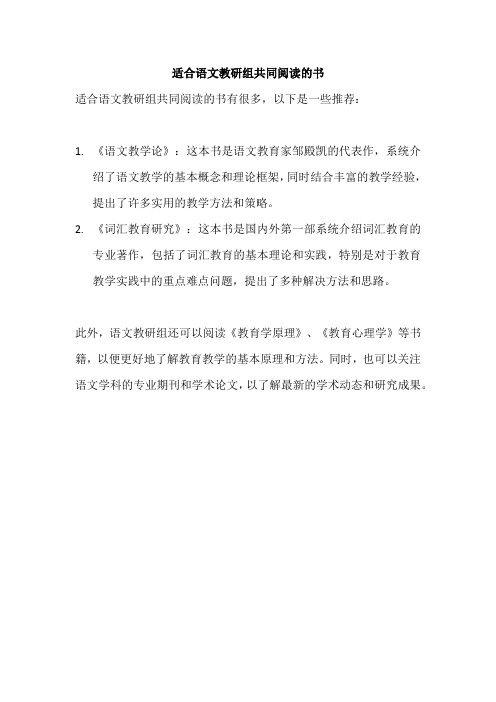
适合语文教研组共同阅读的书
适合语文教研组共同阅读的书有很多,以下是一些推荐:
1.《语文教学论》:这本书是语文教育家邹殿凯的代表作,系统介
绍了语文教学的基本概念和理论框架,同时结合丰富的教学经验,提出了许多实用的教学方法和策略。
2.《词汇教育研究》:这本书是国内外第一部系统介绍词汇教育的
专业著作,包括了词汇教育的基本理论和实践,特别是对于教育教学实践中的重点难点问题,提出了多种解决方法和思路。
此外,语文教研组还可以阅读《教育学原理》、《教育心理学》等书籍,以便更好地了解教育教学的基本原理和方法。
同时,也可以关注语文学科的专业期刊和学术论文,以了解最新的学术动态和研究成果。
- 1、下载文档前请自行甄别文档内容的完整性,平台不提供额外的编辑、内容补充、找答案等附加服务。
- 2、"仅部分预览"的文档,不可在线预览部分如存在完整性等问题,可反馈申请退款(可完整预览的文档不适用该条件!)。
- 3、如文档侵犯您的权益,请联系客服反馈,我们会尽快为您处理(人工客服工作时间:9:00-18:30)。
学科教学语文研究生必读书目
一、着作类(50种)
[1]小威廉姆·E·多尔:后现代课程观(王红宇译)[M].北京:教育科学出版社2002年版.
[2]大卫·杰弗里·史密斯:全球化与后现代教育学[M]. 北京:教育科学出版社,2001年版.
[3张华:课程与教学论[M]. 上海:上海教育出版社,2000年版.
[4]雅斯贝尔斯:什么是教育(邹进译)[M].北京:三联书店,1991年版.
[5]Bruce Joyce等着,荆建华等译:教学模式[M].北京:中国轻工业出版社,2009年版.
[6]古德、布罗菲着,陶志琼译:透视课堂[M].北京:中国轻工业出版社,2002年版.
[7]佐藤学着,钟启泉译:静悄悄的革命——创造活动的、合作的、反思的综合性学习[M].长春:长春出版社,2003年版.
[8]加里?D.鲍里奇着,易东平译:有效教学方法[M].南京:江苏教育出版社,2002年版.
[9]马克斯?范梅南着,李树英译:教学机智——教学智慧的意蕴[M].北京:人教育科学出版社,2001年版.
[10] 钟启泉、崔允郭主编:新课程的理念与创新(师范生读本)[M].北京:高等教育出版社,2003年版.
[11]靳? 健:后现代文化视界的语文课程与教学论[M]. 兰州:甘肃教育出版社,2006年版.
[12]倪文锦、欧阳汝颖:语文教育展望[M]. 上海:华东师大出版社,2002年版.
[13]王荣生:语文科课程论基础[M]. 上海:上海教育出版社,2006年版.
[14]倪文锦、谢锡金:新编语文课程与教学论[M]. 上海:华东师范大学出版社,2006年版.
[15]林存华:听课的变革[M].教育科学出版社,2007.
[16]郑金洲:说课的变革[M].教育科学出版社,2007.
[17]沈毅等:课堂观察——走向专业的听评课[M].华东师范大学出版社,2009.
[18]欧培民:语文课堂教学行为研究及案例[M].江西教育出版社,2009.
[19]王尚文:语文教学对话论[M].浙江教育出版社,2004.
[20]姚素珍:香港中学文学教学研究[M].广东教育出版社,2006.
[21]张永德:香港小学文学教学研究[M].广东教育出版社,2006.
[22]蔡美惠:台湾中学国文教学研究[M].广东教育出版社,2006.
[23]方智范:初中语文新课程案例分析[M].高等教育出版社,2008.
[24]李山林:语文课程与教学论案例教程[M].湖南师范大学出版社,2006年版.
[25]王荣生:走进课堂——高中语文必修课例分析[M].高等教育出版社,2006年版.
[26]李镇西:听李镇西老师讲课[M].华东师范大学出版社,2005年版.
[27]袁卫星:听袁卫星老师讲课[M].华东师范大学出版社, 2005年版.
[28]窦桂梅:听窦桂梅老师讲课[M].华东师范大学出版社,2005年版.
[29]韩军:听韩军老师讲课[M].华东师范大学出版社, 2006年版.
[30]余映潮:听余映潮老师讲课[M].华东师范大学出版社,2006年版.
[31]郭初阳:言说抵抗沉默——郭初阳课堂实录[M].华东师范大学出版社,2006年版.
[32]郑桂华:听郑桂华老师讲课[M].华东师范大学出版社,2007年版.
[33]王荣生:听王荣生教授评课[M].华东师范大学出版社,2007年版.
[34]雷玲:好课是这样炼成的——品读名师经典课堂(语文卷)[M].华东师大出版社,2007.年版.
[35]雷玲:名师教学机智例谈(语文卷)[M].华东师范大学出版社,2007年版.
[36]王爱娣:美国语文教育[M].广西师范大学出版社,2007年版.
[37]钱理群:语文教学门外谈[M].桂林:广西师范大学出版社,2003年版.
[38]钱理群:名作重读[M].上海:上海教育出版社,2006版.
[39] 洪宗礼等:母语教材研究(全十卷)[M].南京:江苏教育出版社,2008版.
[40] 王荣生、郑桂华:1978-2005语文教育研究大系:中学卷[M].上海:上海教育出版社,2007版.
[41] 王富仁、郑国民:语文教学与文学/文艺学与中小学语文教学研究丛书[M].广州:广东教育出版社,2006版.
[42] 孙绍振:名作细读[M].上海:上海教育出版社,2006版.
[43] 王荣生:新课标与“语文教学内容”[M].南宁:广西教育出版社,2004版.
[44] 张隆华,曾仲珊:中国古代语文教育[M].成都:四川教育出版社,2000年版.
[45] 李杏保,顾黄初:中国现代语文教育史[M].成都:四川教育出版社,2000年版.
[46] 王荣生主编:走进课堂——高中语文必修课例分析[M].北京:高等教育出版社,2006年版.
[47] 张田若、陈良璜、李卫民:中国当代汉字认读与书写[M].成都:四川教育出版社,2000.
[48] 韩雪屏:中国当代阅读理论与阅读教学[M]. 成都:四川教育出版社,2000年版.
[49] 张鸿苓:中国当代听说理论与听说教学[M]. 成都:四川教育出版社,2000年版.
[50] 章熊:中国当代写作与阅读测试[M]. 成都:四川教育出版社,2000年版.
二、期刊类
1.《人大复印资料·中学语文教与学》,中国人民大学报刊复印资料中心主办
2. 《课程·教材·教法》,人民教育出版社课程教材研究所主办
3.《中学语文教学》,首都师范大学主办
4.《语文学习》,上海教育出版社主办
5.《语文教学通讯》,山西师范大学主办
6.《语文建设》,国家语委语言文字报刊社主办
7.《语文教学与研究》,华中师范大学
8.《中学语文教学参考》,陕西师范大学教育出版集团·杂志社主办
9.《教育研究》,中央教育科学研究所主办
10.《新华文摘》,人民出版社主办。
